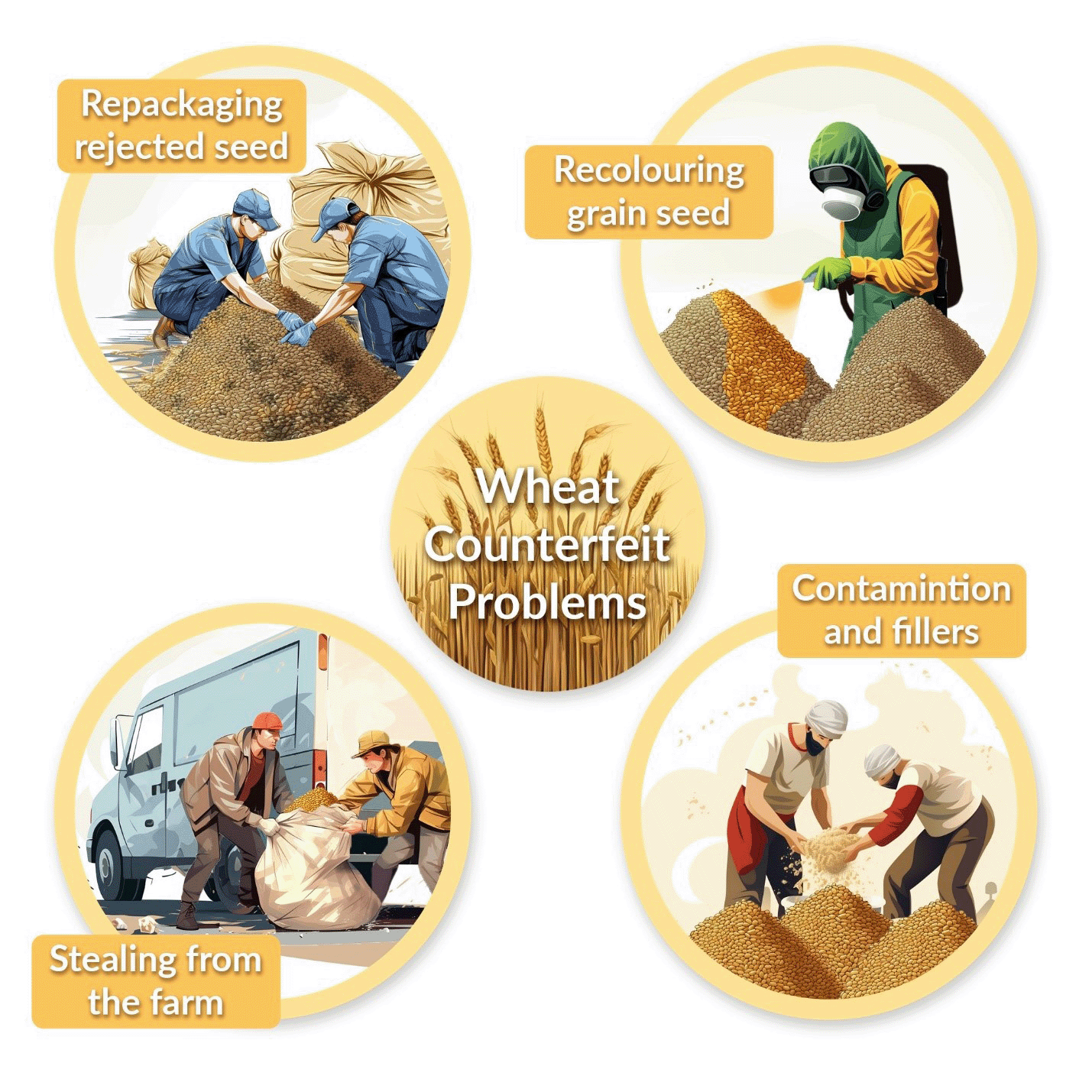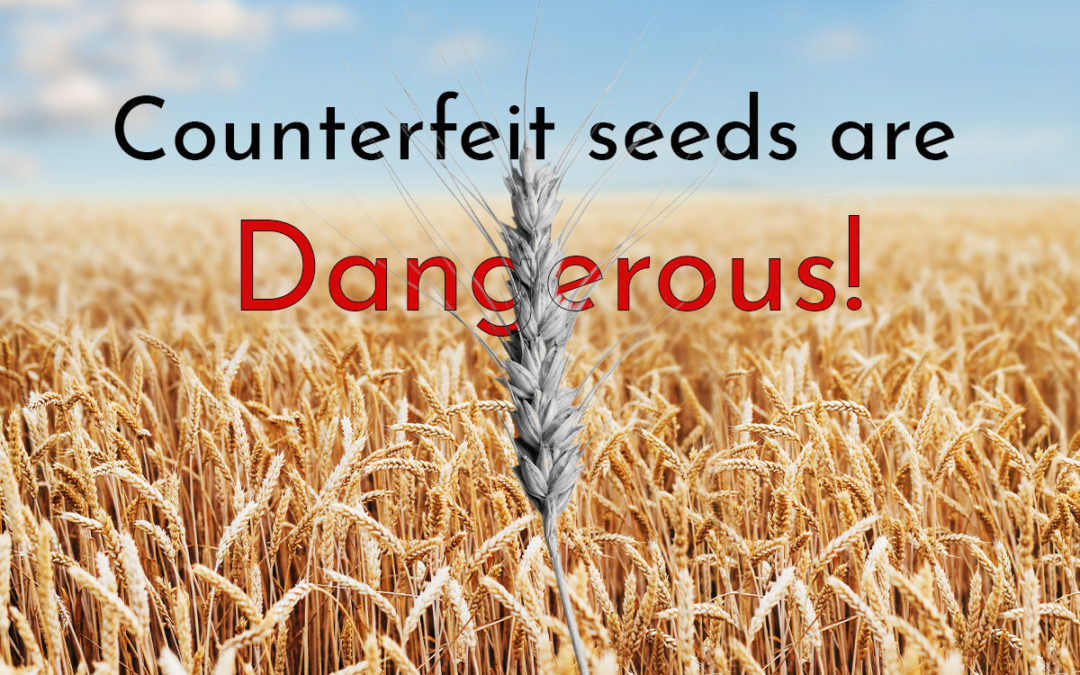Seeds are the root of the global agricultural industry, which is a multi-trillion-dollar industry. This massive scale of the industry makes it a lucrative sector for counterfeiters. These counterfeit seeds have far-reaching consequences on the farmers and the environment. It’s the corporate responsibility of agrochemical companies to implement anti-counterfeiting solutions and protect the seeds from counterfeiting, safeguarding farmers and the agricultural ecosystem.
The seed industry is valued at approximately USD 67 billion and is expected to grow up to USD 92 billion by 2028. This growth of the industry attracts counterfeiters as the profit margin in counterfeiting can be quite high. A report by World Bank estimates that almost half of the seeds sold in Africa are fake. In Uganda’s National Seed Policy 2018 report too, the estimate of counterfeit seeds stands at 30-40%.
This illegal trade put the livelihood of farmers at risk, along with the lives of farmers in danger. Researchers have identified monetary issues and indebtedness as one of the leading causes of suicide in farmers (especially in developing countries).
Counterfeit seeds are also harmful to seed-producing companies as they are infringements of trademarks and intellectual property rights. However, with anti-counterfeiting solutions and spreading awareness, agricultural brands can protect their brand as well as the entire agricultural industry.

Impact of Counterfeit Seeds – on Farmers and the Environment
As seeds are an integral part of farming, counterfeited ones disrupt the entire ecosystem of agriculture. Here are some important consequences of them.
Crop Failure, Reduced Yield, and Financial Losses
Seed quality is 15-20% responsible for crop productivity. Counterfeit seeds are low in quality and usually lack the genetic traits and characteristics necessary for optimal growth and productivity. This leads to poor germination, weak plant development, and reduced crop yield.
In fact, fake seeds can result in the failure of up to 66% or two-thirds of a farmer’s total production. The cost of them is one of the core expenses in farming. Hence, the failure or a decrease in production yield translates to financial distress for farmers, affecting their livelihoods and economic stability. This loss has a rippling effect on the subsequent harvest seasons as farmers are unable to make enough money to invest in high-quality seeds.
Above all, farmers also lose trust, which leads to fear of purchasing seeds. If they were sold counterfeited seeds once, what’s the guarantee it wouldn’t happen again, leading to monetary loss? This is a question that every small-scale farmer who has been fooled once, asks.
Environmental Implications: Erosion, Reduced Soil Fertility, and Pesticide Resistance
Forged seeds not only impact farmers but also have adverse effects on the environment in the form of soil erosion. They lead to weak plant growth and inadequate root development, resulting in reduced soil coverage and increased vulnerability to erosion. Soil erosion not only leads to the loss of fertile topsoil but also affects water quality, as eroded soil particles can contaminate nearby water bodies.
This soil erosion also impacts soil productivity in the later seasons. Studies show that soil loss of 10 cm can lead to a 26.6% decrease in the agricultural productivity of that soil.
They also reduce soil fertility as they lack the genetic traits to promote nutrient uptake and cycling within the soil ecosystem. As a result, the soil becomes depleted of essential nutrients, affecting the long-term productivity and sustainability of agricultural land.
Adverse Effects on Biodiversity and Ecosystem Health
Farmers who unknowingly plant counterfeit seeds apply higher-than-recommended pesticide doses in an attempt to combat the poor performance of the crops. The excessive use of pesticides leads to environmental pollution, contaminates soil, water bodies, and surrounding ecosystems.
The impact on farmers’ livelihoods and the environment compels agrochemical brands to take proactive measures. Implementing anti-counterfeiting measures, stringent quality control measures, raising awareness among farmers, and supporting initiatives for sustainable farming practices are essential steps to mitigate the detrimental effects of these seeds.
Importance of Sustainable Farming, Especially in Developing Countries
By adopting sustainable farming methods such as agroforestry and organic farming, farmers promote soil health, conserve water, and reduce greenhouse gas emissions.
According to the World Bank, 78% of the world’s poorest population residing in rural areas are largely dependent on agriculture. Sustainable farming practices in these regions ensure food security, poverty reduction, and overall economic development.
Farmers in these regions are also more vulnerable to purchasing forged seeds due to limited resources, lack of access to information, and inadequate regulatory frameworks.
In 2021, major news about counterfeit seeds in India came to light, where farmers unknowingly purchased fake cotton seeds. This resulted in crop failure and financial losses for thousands of farmers. This incident shows the vulnerability of farmers in developing countries and the importance of ensuring access to genuine, high-quality raw materials.
The adoption of sustainable farming practices can increase yields by up to 79% in developing countries. Plus, sustainable farming practices helps in preserving the environment and reducing the impacts of climate change. Developing countries are often more susceptible to the adverse effects of climate change, including erratic weather patterns, droughts, and soil degradation.
Reasons Why Seeds Are Counterfeited
The multi-layered supply chain of seeds makes them more susceptible to adulterating. The companies selling authentic seeds package them in large bags. As they move down the supply chain, they are split into smaller bags in retail stores for convenient selling. This splitting up into smaller packages creates the opportunity to dilute the genuine seeds with fake ones.
Other reasons include:
- The policies and regulations are weak when it comes to counterfeiting farming products. The issue is even worse in developing countries such as Africa. Kassim Owino, Chairman of Seed Co Group, suggests that the core issue is the lack of coordination between law enforcement and agrochemical companies.
- The global demand for seeds is on the rise with the growing population, making it a profit lucrative industry for counterfeiters.
- The process to authenticate genuine seeds is complex and usually not accessible to farmers. Counterfeiters use advanced technology for packaging to replicate the visual authentication marks, deceiving farmers into buying fake products.
- The cost of production of fake seeds is significantly less than the price they’re sold at. This gives a huge profit margin to the counterfeiters, incentivizing them. The allure of profits, coupled with the relatively low risk of detection and punishment, drives counterfeiters to continue their operations.
Current Solutions to Authenticate Seeds
- Holograms: Holograms look like shiny stickers which carry unique product information. This gives consumers the trust that they’re buying genuine products but counterfeiters have become extremely advanced with their technology, easily copying holograms.
- post their purchase. They can then verify the product by sharing this code via an SMS to the brand. The problem, however, lies in the fact that the counterfeit packages with a copy of the genuine products’ code can be verified first. This would deem the authentic product as the forged one, while the forged package would be considered genuine.
- Barcodes and QR codes: Codes that can be scanned to determine authenticity are another popular solution to counterfeiting. The problem, however, is these codes are extremely easy to copy and consumers can’t distinguish genuine code from the counterfeited one.
- Tamperproof packaging: This system is used at mass, but this is easily replicable by counterfeiters.
- Spectroscopy: Infrared spectroscopy checks the impurities present in a single or batch collection of seeds. The results are determined by analyzing the uniformity of the seed collection. However, this method isn’t accessible to most farmers.
AlpVision Anti-counterfeiting Solution for Seeds
While there are some anti-counterfeiting solutions in the market currently, they’re not counterfeit-proof, meaning they can be easily replicated by counterfeiters.
The other advanced solutions aren’t available to small-scale farmers living in rural areas without much technical knowledge, or the time to validate a seed via a complicated technical system.
This is where AlpVision comes in. AlpVision’s Cryptoglyph is a cutting-edge anti-counterfeiting technology, almost impossible to replicate. In simpler words, it’s almost unclonable. Cryptoglyph is an invisible, microscopic marking applied to the packaging of seeds, for example, on labels or flexible bags. It’s applied during the printing process, without any change of design or production process.
It can be easily authenticated by a free smartphone app. This part is important as small-scale farmers don’t have a lot of money to invest in the extra authentication nor do they have vast technical knowledge. The simplicity and cost-free authentication process make it accessible to every type of seed purchaser.
Ethical and Social Responsibility of Agricultural Brands to Implement Anti-Counterfeiting Seeds Solutions
Agricultural brands have an ethical and social responsibility to protect the well-being of farmers and the environment.
Along with that, the use of counterfeit seeds also has economic implications for brands. When farmers experience yield failure or reduced yields due to them, it erodes their trust in the brand and leads to a loss of customer loyalty. The negative impacts on farmers’ livelihoods can also result in a decline in the overall demand for agricultural products.
By supporting sustainable farming practices and ensuring the availability of genuine, high-quality seeds, agricultural brands can maintain their reputation, build stronger relationships with farmers, and secure long-term market sustainability.
To learn more about the anti-counterfeiting solutions you can use to safeguard your market position and align with your corporate responsibility, contact us today.
Contact Us

